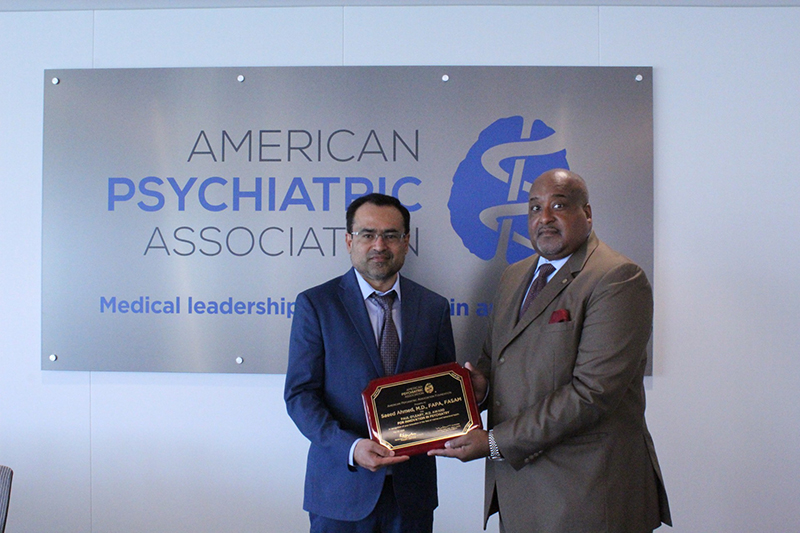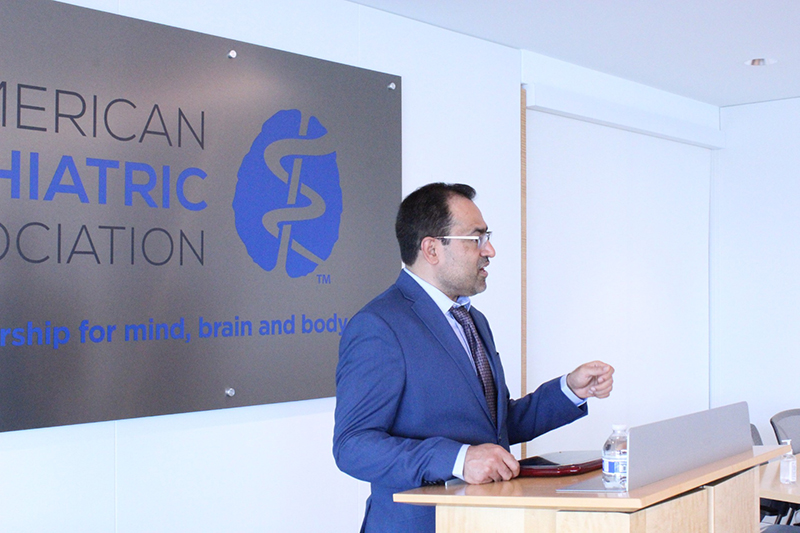At APA’s 2025 Annual Meeting in May, Saeed Ahmed, M.D., FAPA, became the third winner of the O’Leary Award for his project to streamline Opioid Treatment Program (OTP) delivery via secure medication dispensers. Dr. Ahmed is a triple board-certified psychiatrist specializing in adult psychiatry and addiction medicine who currently practices at St. Francis Hospital in Hartford, CT.

Paul J. O'Leary, M.D., was a leader in the American Psychiatric Association and was also deeply involved in local and state psychiatric organizations, in addition to his full-time practice and his cherished roles of husband and father. After his untimely death, the APA Foundation established the annual O'Leary Award for Innovation in Psychiatry, which funds innovative ideas in mental and behavioral health, to carry forward the spirit of creativity that defined O'Leary’s work.
What was Dr. Ahmed’s ingenious idea? The concept he proposed is essentially a pill dispenser that can be operated by opioid treatment programs (OTPs) through an app. In this proposed model, patients would be provided with a secure dispenser resembling a standard medication container, programmed and preloaded with a 30-day supply of methadone.
Inspired by the successful use of Video Directly Observed Therapy (vDOT) in tuberculosis treatment, Dr. Ahmed proposed an automated medication dispenser and companion app to support safe, flexible access to methadone for patients with opioid use disorder. The proposed system would allow access to only one dose per day and would include a video function to help clinicians monitor patients’ use of the device. Studies have shown that electronic pillboxes combined with remote monitoring apps can lead to high levels of patient adherence and treatment retention. If implemented, the system would also include tamper detection features, alerting clinicians to any attempts to access multiple doses or breach the device. The goal is to support patients’ accountability and engagement.
The device also helps patients overcome the barrier of mental health stigma. “People assume that if they walk into a methadone clinic, or even if they are seen waiting at a bus stop next to a methadone clinic, then they will be seen as an opioid user and stereotyped accordingly. It’s better to minimize the exposure to that circumstance by only requiring them to visit once a month to pick up the next month’s supply [of methadone],” said Dr. Ahmed. “People get discouraged from seeking treatment when they’re frequently in situations where they may be stigmatized.”
The device removes multiple barriers to mental health care, including the barrier of access: “A lot of patients who have substance use disorder have no active driver’s license, or they may have a DUI charge, or they may not have the finances to maintain a private car and insurance,” said Dr. Ahmed. “They can end up relying on public transportation, which creates an access issue where it can take five hours to pick up a dose of methadone. So why don’t we just give them a programmed, automated medication dispenser with methadone? That frees up more time for them to function in their own communities, to find a job and go to work. It just facilitates that access to treatment.”
In addition to changing lives on an individual level, the device has the potential to create systems-level change when scaled. “When someone is struggling with opioids, cocaine or alcohol use, families become dysfunctional — it especially impacts kids — and not only that, we frequently see a ripple effect in the surrounding community,” said Dr. Ahmed. “When individuals can access and stay in treatment, we hear from families that things begin to stabilize — not just at home, but across the community. Reducing barriers to care, like daily clinic visits, helps people stay engaged in treatment, regain stability, and ultimately rely less on public support systems like food stamps or disability. When people return to functioning, their improved health benefits not only themselves but those around them.”

Applications are open for all APA/APAF Awards, including the O’Leary Award, from May 30 to August 15, 2025. Learn more and apply or nominate a peer for the 2026 O’Leary Award at apply.psychiatry.org.
